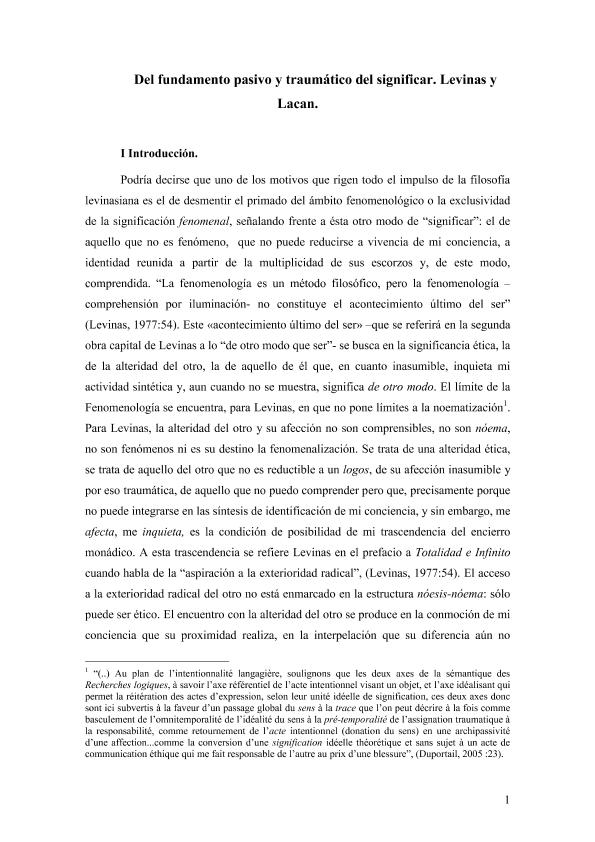Artículo
El lenguaje como significación o sentido está en lugar de otra cosa que falta. Responde al vacío central -traumático- del campo del goce. Es suplencia fallida y, por lo tanto, al mismo tiempo reveladora de la falta que intenta suplir. En razón de esta función de suplencia, el lenguaje se encuentra estructuralmente alienado en el campo del goce. El intento de este artículo es dar cuenta de estas tesis del psicoanálisis lacaniano y extraer de ellas algunas precisiones para la comprensión de la diferencia entre Decir y Dicho en la fenomenología levinasiana del lenguaje, particularmente en lo que atañe a la articulación del orden sensible (vulnerabilidad) y el orden de las significaciones ideales. The language as significance or sense is in the place of something that is absent. It responds to the central -traumatic- gap of the enjoyment's field. It is a failed substitute and, therefore and at the same time, it reveals the lack that he intends to replace. Because of this function of substitution, the language is, in a structural way, alienated in the enjoyment's field. The intention of this article is to explain these theories of lacanian psychoanalysis and to extract some precisions for the comprehension of the difference between Saying and Said in levinasian phenomenology of language, particularly in what concerns to the articulation of sensible order (vulnerability) and the order of ideal significances.
Del fundamento pasivo y traumático del significar: Levinas y Lacan
Fecha de publicación:
12/2012
Editorial:
Universidad Nacional del Sur. Instituto de Humanidades
Revista:
Cuadernos del Sur. Filosofía
ISSN:
1668-7434
e-ISSN:
2362-2989
Idioma:
Español
Tipo de recurso:
Artículo publicado
Clasificación temática:
Resumen
Palabras clave:
Lenguaje
,
Trauma
,
Significación
,
Lacan-Lévinas
Archivos asociados
Licencia
Identificadores
Colecciones
Articulos(IIGHI)
Articulos de INST.DE INVEST.GEOHISTORICAS (I)
Articulos de INST.DE INVEST.GEOHISTORICAS (I)
Citación
Leconte, Mariana; Del fundamento pasivo y traumático del significar: Levinas y Lacan; Universidad Nacional del Sur. Instituto de Humanidades; Cuadernos del Sur. Filosofía; 39; 12-2012; 135-147
Compartir




